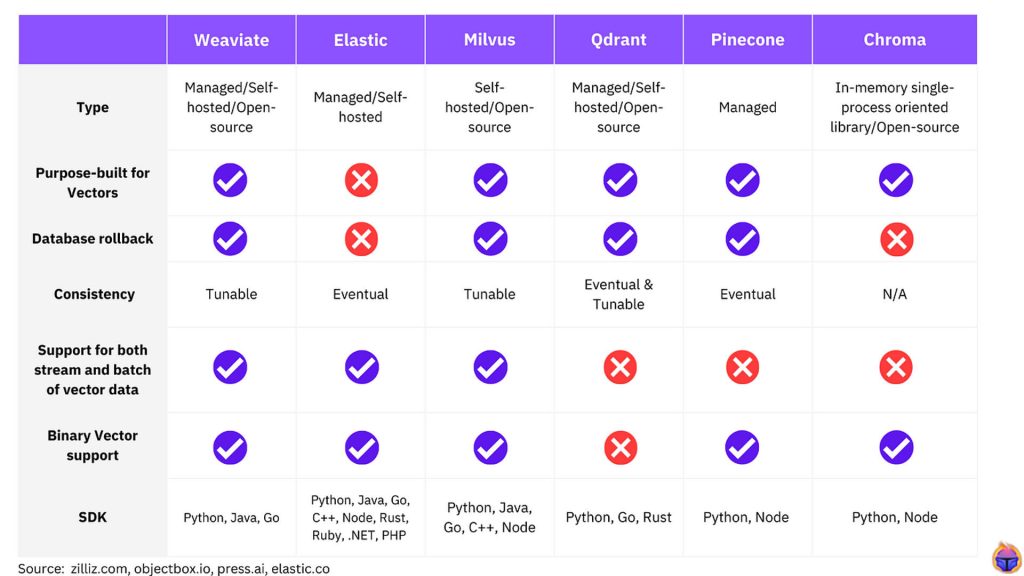RAG Architecture relies on vector databases to efficiently store, retrieve, and manage high-dimensional embeddings. As RAG-based systems gain popularity, selecting the right database is crucial for ensuring fast, accurate, and secure information retrieval. In this guide, we’ll explore and compare several leading vector databases across key performance factors.
Key Parameters for Comparison
When evaluating vector databases for a RAG system, consider the following key parameters:
Performance & Speed:
How fast can the database index and query large volumes of high-dimensional data?
Scalability:
Can the solution handle growth in data volume and concurrent queries?
Integration & Flexibility:
How easily does the database integrate with existing infrastructure and support various data types?
Accuracy & Relevance:
What similarity search methods are available, and how customizable are they?
Security & Compliance:
What measures are in place to protect sensitive data?
Cost & Operational Overhead:
How do pricing models and maintenance needs compare?
Comparative Analysis of Popular Vector Databases

Below is a comparison of some leading options: Pinecone, Weaviate, Milvus, FAISS, and OpenSearch.
1. Pinecone
Performance & Speed:
Optimized for real-time, low-latency queries with advanced indexing algorithms.
Scalability:
Offers seamless scaling through a fully managed, cloud-based architecture.
Integration & Flexibility:
Provides robust APIs and integrates well with popular ML frameworks.
Accuracy & Relevance:
Uses state-of-the-art similarity measures; tuning parameters is straightforward.
Security & Compliance:
Implements strong security protocols and data encryption.
Cost & Operational Overhead:
Managed service with a subscription-based pricing model; minimal overhead.
2. Weaviate
Performance & Speed:
Delivers efficient vector search with support for various indexing options.
Scalability:
Designed to scale horizontally; well-suited for enterprise-level deployments.
Integration & Flexibility:
Open-source with modular architecture and flexible schema design.
Accuracy & Relevance:
Customizable similarity measures; supports hybrid search (combining vector and keyword search).
Security & Compliance:
Provides enterprise-grade security features including role-based access control.
Cost & Operational Overhead:
Open-source nature allows cost efficiency; however, self-hosting may add operational complexity.
3. Milvus
Performance & Speed:
Excels in large-scale similarity search and leverages GPU acceleration.
Scalability:
Built for massive datasets with strong support for distributed deployment.
Integration & Flexibility:
Integrates with multiple frameworks and data processing pipelines.
Accuracy & Relevance:
Supports various distance metrics and fine-tuning for specialized tasks.
Security & Compliance:
Implements robust security protocols; enterprise-ready.
Cost & Operational Overhead:
Offers both open-source and managed service options; GPU-based acceleration might increase costs.
4. FAISS (Facebook AI Similarity Search)

Performance & Speed:
Known for high-speed search in high-dimensional spaces; excellent for research and prototyping.
Scalability:
Highly efficient on single machines, but scaling out requires additional custom integration.
Integration & Flexibility:
Library-focused solution; requires more effort to integrate into production environments.
Accuracy & Relevance:
Provides state-of-the-art algorithms for similarity search; parameter tuning is highly customizable.
Security & Compliance:
Security features depend on the overall infrastructure since FAISS is primarily a library.
Cost & Operational Overhead:
Free and open-source, but may demand significant engineering effort to operationalize at scale.
5. OpenSearch
Performance & Speed:
Originally a full-text search engine, OpenSearch has evolved to support vector search via plugins (e.g., kNN plugin). While it may not match the performance of specialized vector databases in pure vector search benchmarks, it offers competitive speeds for hybrid search workloads.
Scalability:
Built on a distributed architecture, it can scale horizontally and is suitable for handling large datasets.
Integration & Flexibility:
Integrates natively with the Elasticsearch ecosystem and provides RESTful APIs. Ideal for use cases requiring both keyword and vector searches.
Accuracy & Relevance:
Offers vector search capabilities alongside traditional text search, which can be beneficial for combined use cases. Customizable similarity metrics are available, though tuning might be less straightforward than dedicated vector DBs.
Security & Compliance:
Provides enterprise security features, including encryption and fine-grained access control, similar to other enterprise search solutions.
Cost & Operational Overhead:
Open-source with options for managed services; might be a cost-effective option if you already use it for full-text search.
When to Choose Each Option
Pinecone and Milvus are excellent for teams prioritizing speed and scalability, especially when working with massive, high-dimensional datasets in a production environment.
Weaviate offers a flexible, open-source alternative that shines in environments requiring modularity and hybrid search capabilities.
FAISS is ideal for research or prototyping phases where rapid experimentation and state-of-the-art performance are crucial, albeit with more manual integration.
OpenSearch stands out if your use case benefits from combining traditional full-text search with vector search, or if you are already invested in the OpenSearch/Elasticsearch ecosystem and want to extend its capabilities.
Conclusion
Choosing the right vector database for your RAG architecture involves balancing performance, scalability, integration capabilities, accuracy, security, and cost. By comparing options like Pinecone, Weaviate, Milvus, FAISS, and OpenSearch, you can select a solution tailored to your specific needs. Whether you prioritise dedicated vector search speed or the benefits of a hybrid search engine, the right choice will empower your RAG system to deliver fast, accurate, and contextually rich results.
For expert guidance in implementing scalable AI infrastructure and vector search technologies, consider partnering with Dev Centre House Ireland, a leader in delivering high-performance backend and AI solutions.



